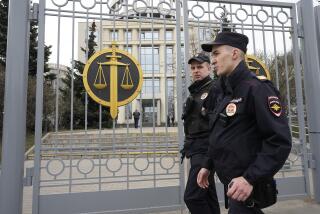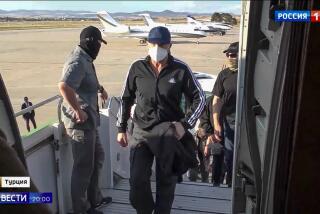Soviets Offer to Free Dissident Marchenko
- Share via
MOSCOW — Soviet authorities have offered to release human rights activist Anatoly Marchenko from prison and to fly him and his wife and son to Israel, his wife reported Tuesday.
Marchenko, 48, was one of the founding members of the Soviet human rights movement in the 1960s. He has spent 20 years in prison, labor camps and Siberian exile.
He is currently in Chistopol Prison, 600 miles east of Moscow, serving a 10-year sentence on a charge of anti-Soviet agitation and propaganda. He is not due to be released from a final five-year period of internal exile until 1996.
His wife, Larisa Bogoraz, said the KGB security police summoned her last Friday and asked her to complete an application form for exit visas for Marchenko, their 13-year-old son, Pavel, and herself. She said she insisted first on being allowed to meet with her husband, whom she has not seen in nearly three years, to discuss the offer.
Wife Unsure of Intent
“I did not know how he wants to resolve his fate,” she said in a telephone conversation with a Western reporter. She added that the KGB had led her to believe her husband was reluctant to emigrate.
Before his last conviction in 1981, Marchenko spurned KGB offers to allow him to go to Israel--although he knew the alternative was prison or forced labor--on the grounds that he is not Jewish, has no relatives in Israel and would not ordinarily qualify to emigrate under Soviet law. His wife is Jewish but has no relatives in Israel who could provide the formal invitation that Soviet law requires.
Bogoraz said she met again on Monday with KGB officials in Moscow and gave them a statement asking the KGB and the Ministry of Internal Affairs to let her discuss the offer with her husband. She said the officials promised her an answer today.
Marchenko, a blue-collar worker from a poor Siberian family, is reguarded as unique in the Soviet human rights movement for his boldness, tenacity and his long years of imprisonment. He is best known as the first dissenter living in the Soviet Union to circulate a detailed manuscript--under his own name--describing the conditions for political prisoners in labor camps of the post-Stalin era.
Book Published in West
His underground book, titled “My Testimony,” has been published in the West.
In December, 1983, Marchenko was severely beaten, and since then he reportedly has suffered from a partial loss of eyesight and severe headaches. He has also sustained a hunger strike to protest abuses in the labor camps.
The KGB offer to send Marchenko and his family abroad appears to be part of a gradual, systematic effort to resolve some of the oldest and most troublesome human rights cases, in the hope of improving Moscow’s image abroad.
That effort began last February, with the release of the Jewish human rights activist Anatoly Shcharansky. In recent weeks, the Soviets released physicist Yuri Orlov from Siberian exile and allowed him to emigrate and gave permission to David Goldfarb, a longtime Jewish “refusenik” from Moscow, to go to the United States.
In October, Irina Ratushinskaya, widely regarded as one of the country’s most brilliant young poets, was released from prison in Kiev, where she was serving a seven-year sentence on charges of writing anti-Soviet verse. Dissident sources said that Ratushinskaya, 32, is suffering from serious ailments that have left her barely able to walk the length of her small apartment.
The sources said the authorities have not responded to her request for permission to move to the West with her husband, Igor Gerashchenko.
More to Read
Sign up for Essential California
The most important California stories and recommendations in your inbox every morning.
You may occasionally receive promotional content from the Los Angeles Times.










